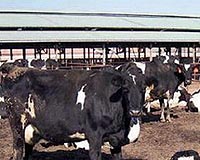 |
Quito (AFP) April 1, 2011 Ecologically friendly Ecuadoran banana producers, with the help of President Rafael Correa, are trying to secure their niche in a market dominated by multi-national giants. The organic farmers' cooperative El Guabo was founded in 1998 in the agricultural region of El Oro iby farmers who wanted to be independent from big companies. And they are proud of their achievements. The cooperative has brought together some 350 farmers who have all chosen to produce organic bananas. "I produce 100 boxes a week while producers who use pesticides make between 350 and 500 boxes. But I have decided to preserve my health and my land," says one member, Wilson Sanchez. The producers control quality, collection of bananas and their transportation to market. They have won the prestigious international label "Fair Trade" certifying the "sustainable" character of their business, and they now produce 33,000 tons, still a small amount compared with the 2.5 million tons exported in 2010. Their bananas are more expensive at $7.5 (5.3 euros) a box compared with $5.5 for conventional bananas. But returns from their sales would be higher if multinationals respected export prices set by the state. "With the cooperative, we are under less pressure from exporters, even though they always try to lower the export price despite government controls," says Romulo Archibald, a regional organic producer from Machala. "That is why we must create our own distribution network and no longer depend on intermediaries." Ecuador exports approximately $1.8 billion worth of bananas a year. But three-quarters of this trade is controlled by multinationals from the United States: Chiquita Brands International and Dole Food Company each command 25 percent of the market, while Del Monte Fresh Products claims 15 percent and Fyffes eight percent. Noboa, an Ecuadoran producer, controls 11 percent. Since the 1970s, they have been dictating the price of a box of bananas, notes Eduardo Lesdesma of the Association of Ecuadoran Banana Exporters (AEBE). But with the coming to power of Socialist President Rafael Correa in 2008, the situation has begun to change thanks to a law that sets a fixed price on a box of bananas. Fifteen out of 140 exporters, including the giant Bananera Continental Banacont belonging to the family of former president Alvaro Noboa, have been under investigation for possible violations of this rule. "If we have to nationalize banana exports in order to make companies respect the price, we will do it because we have had enough of this shameful practice," Correa warned. The AEBE is opposed the idea of nationalizing the industry, although it recognizes the existence of a conflict. "We need to enforce standards" and "the official price should be paid through the central bank," the association says. Conventional producers sometimes express their solidarity with the organic ones as a means of confronting the multinationals. "Of course, organic farmers produce less than us, but they stand up for their cooperative to impose financial conditions and usually win in negotiations because they almost always sell at the official price," says Boanerges Correal, a non-organic banana producer. The banana industry employs 1.4 million people, or about one-tenth of Ecuador's population. The main export markets are Russia (23 percent), the Baltic countries (22 percent), the European Union (19 percent), the United States (18 percent), followed by the Middle East, Asia and Africa. But only organic farmers currently manage to secure the minimum wage, or $70 per week. This is $280 per month less than the monthly minimum needed for a family of four, which is currently calculated at $548.
Share This Article With Planet Earth
Related Links Farming Today - Suppliers and Technology
 Half China's dairies shut in safety audit: govt
Half China's dairies shut in safety audit: govtBeijing (AFP) April 2, 2011 Nearly half of Chinese dairies inspected in a government safety audit have been ordered to stop production, a spokesman said on Saturday. The move follows the 2008 baby milk health scandal, in which Chinese authorities said at least six babies died and another 300,000 were sickened. China's dairy industry was rocked that year by revelations that the industrial chemical melamine was added ... read more |
|
| The content herein, unless otherwise known to be public domain, are Copyright 1995-2010 - SpaceDaily. AFP and UPI Wire Stories are copyright Agence France-Presse and United Press International. ESA Portal Reports are copyright European Space Agency. All NASA sourced material is public domain. Additional copyrights may apply in whole or part to other bona fide parties. Advertising does not imply endorsement,agreement or approval of any opinions, statements or information provided by SpaceDaily on any Web page published or hosted by SpaceDaily. Privacy Statement |